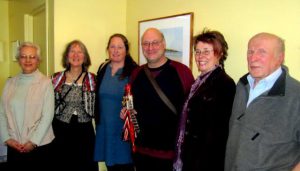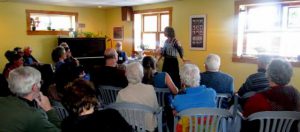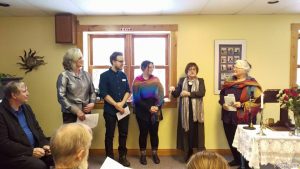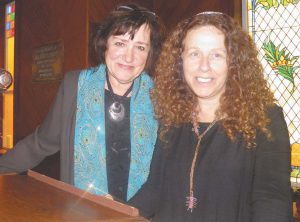On April 17, Dr. Harvey White, professor of religion at Bishop’s University, gave this talk, which we titled “All About God.” He has kindly provided this text of his talk.
He writes, “I enjoyed the occasion. You are a group of wonderful people there.”
In Book 9 of his Confessions, Augustine describes an experience that climaxed his search for God:
She [Monica, Augustine’s mother] and I stood alone, leaning in a window, which looked inwards towards the garden within the house where we were staying”
he continued:
“while we were talking of God’s wisdom and panting for it, with all the effort of our heart we did for one instant touch it”.
There’s a well known Augustinian injunction: “Therefore do not seek to understand in order to believe, but believe that you may understand; since, unless you believe, you shall not understand. I believe in order to understand.” [Tractate 29 on the Gospel of John]. Augustine had no doubt about that he had touched that which had called him.
But now, reflecting on that pilgrimage, he sought to understand it: “How did I get here?”, “What am I now?” and most importantly, “What is it that I love when I love you?” [10.6]. In fact, for Augustine, all three questions are virtually asking the same thing/
A bit later in the text Augustine put it as: “What is it that I love when I love my God?” [10.11] It’s certainly not on a par with loving another person. It’s easier to understand what you love when you love another person. But loving God — loving this ultimate being that had so radically called him?
Augustine’s narrative in the final books of the Confessions concerns his attempts to answer that question. Through a whole series of twists and turns through space – especially the space of his own mind – and some intriguing questions and explorations concerning the appprehension of time, the best he can come up with is a vague sense that his – Augustine’s — knowledge of space and time only barely touches a glimpse of God’s infinity and eternity. It’s more like time and space themselves — and indeed he himself in a proximate way – were surrounded by and partook of the infinite and the eternal. But, as he said, there were no words to capture the moment, or capture that which he and Monica had “touched”.
Although the leading texts of Christianity, the Bible, seem to speak about God, Augustine is uncertain as to how one should understand those texts. Thus his own interpretation of the Genesis creation story is allegorical, and he was aware that there were many ways of interpreting that narrative. He enveighed against anyone who would say that their understanding of the Biblical text was the only correct one, even if including his own. He allowed that there can be any number of differing interpretations – and, he said, they can all legitimately be right! He actually says they can all be true. He illustrates this with an analogy of a number of streams which all emanate from a common source. But here – with the sacred text – the source is not susceptible to investigation. One can’t successfully ask God “What do you mean by ‘In the beginning’”. God is not a person who can be so interrogated.
Indeed, one can’t even ask the person who wrote the text – that person is long gone. But Augustine ups the ante even further – even if the writer was right before you, and you could quiz that person, there is no way you could – as it were – get inside that person’s head to find out the exact meaning he or she intended by the spoken or written words. And thus it is the height of arrogance to presume that one can claim to completely understand what the writer wrote in the way the writer intended. Much less find out what God might have intended.
Augustine wrote a commentary on Genesis – “De Genesi ad Litteram”. The title is commonly translated as “The Literal Meaning of Genesis” – a misleading translation if there ever was one. In the first place the word for “meaning” is simply not there! In the second place, the word “literal” today has the sense of “strictly factual” or “descriptively accurate of what is the case”, but the Latin word litteram is more accurately translated as “text” or “what is written”. A more accurate translation is “About Genesis, regarding what is written”.
And that is the point. All there is is a written text, and as such, it is open to a number of ways of understanding it. Had he entitled it “About Genesis, regarding exactly what God meant to say”…. Arrogance. That, I might add, is the arrogance of dogmatic Fundamentalism.
Of course the point is that there is – as the theologian Karl Barth put it – quoting Sören Kierkegaard – “an infinite qualitative distinction between time and eternity”. To put it in other words, God is not accessible to us in regard to what God is. Indeed, not only was this point a cornerstone of Medieval thought, but is basic to much modern religious thought (excluding fundamentalists) as well.
In the late 5th century CE a Christian writer known as Dionysius the Areopagite produced short works that became immensely influential in the middle ages – Thomas Aquinas, for example, refers to him and quotes him almost as extensively as he does Augustine and Aristotle. It was Dionysius who influentially – although controversially – formulated the notion of “negative theology” – the theological language of “God is not”.
For Aquinas, following Dionysius, the only proper way of speaking about God involves the use of affirmations and negations; thus:
“God is good” – “God is not-good”. They are simultaneously expressed.
The first “God is good” attributes goodness to God in the common sense of goodness: Mary is good, the poem is good. Then the “not-good” denies that God’s goodness is like the human sense of goodness. What the right hand gives, the left hand takes away. In his Summa Theologica, Aquinas, thinking of Dionysius wrote “For what He is not is clearer to us than what He is”. (Pt1Q1A9 Rsp.ob3)
And we’re apparently left hanging onto very little, if anything. It would seem that we can really say nothing of God. And one wonders – is there any difference between a God of whom we can say nothing and no God at all? A kind of theistic atheism?
Bruce Gilbert, chair of the Department of Liberal Arts at Bishop’s, is giving a course this semester entitled “The Divine and Ultimate Concern”. There are 40 or 50 students registered. The lectures are given by a number of faculty members. I did one on Augustine, Jamie Crooks of the Philosophy Department spoke on the Book of Job, and Dale Stout, in Psychology, spoke about Moby Dick. Jack Eby, from the Music Department, will lecture on the Gregorian Chant. Dr. Gilbert will speak on a text from the East. And there are others. They all have to do with the encounter with a transcendent Voice. With being touched by – or as Augustine puts it – touching something ultimate, something radically other that transforms the mundane and prosaic. That “spiritual experience”.
Of course these are what Augustine and Dionysius and Aquinas and a multitude of others wrote about. In our own time perhaps the best known of such persons is Bishop John Shelby Spong, of whom you may have heard.
What is striking is the wide range of eras and cultures represented. That certainly must give pause to those who question the legitimacy of such experiences – or at least the legitimacy of the belief that these experiences are encounters with something beyond the mere empirical world we inhabit, or are simply no more than some mere psychological aberration. Even that well known opponent of Religion, Christopher Hitchens, at the end of his debate about religion with Tony Blair in Toronto recently, and in an interview in Vanity Fair magazine, admitted that he believes in some transcendence! To quote: “Everybody has had the experience at some point when they feel that there’s more to life than just matter.”
And so Augustine’s question “What is it that I love when I love my God?” seems to have a number of answers. Of course that’s no surprise. Given, at least, that any attempt to definitively circumscribe that God is doomed to failure. Given that the best one can do is speak of what it is not. Ironically, perhaps, Hitchens put his finger on it – more to life than just matter. Augustine and Aquinas would certainly agree! And they agree that because our lives and our words have their meanings from our experiences in this material world, by definition we cannot say what God is. As Aquinas put it – we know that God is, but not what God is.
And, writing about the Bible he said,
The Holy Writing puts before us spiritual and divine things under the comparison of corporeal things….. Dionysius also says (Div. Nom. i), speaking of God: “Neither is there sense, nor image, nor opinion, nor reason, nor knowledge of Him.” Pt.1,Q12.a.1, rsp obj.1)
Here’s the conundrum: People have experiences of the Divine that transcends – the touching and being touched. They can be dismissed as aberrations, or they can be deeply and undeniably felt as genuine encounters. And there is an undeniable quality about them of being touched by a kind of wisdom, and a kind of care and love. The world is not, as Richard Dawkins once described it, “indifferent to human preoccupations” (Unweaving the Rainbow), and “neither kind nor cruel, but indifferent”. (The Devil’s Chaplain).
Like something “out there” that is “right here” and that cares to touch me. A Voice that calls me and invokes a response that makes everything different, ultimately meaningful.
That’s the one side of the coin. The other is that we don’t – can’t – say what that “something” is. We give it a name: “God”, “Jahweh”, “Allah”, whatever.
But the strongly felt impression that that “something” cares and gives meaning to a life seems to demand that we say something about it. Or, to put it another way, we need some language for it — not merely for our subjectively felt experience, but for what it is that is experienced. We need a language to express our response, and,to get some sort of handel on it – to enable us to think about it, consider it, and to at least try and understand it and what it means to us. We cannot remain mute, so we need a language, and this is the language of worship, of prayer, of recognition and response. It’s not simply words, but music and art and liturgy and sacrament.
Indeed, even the awareness that it is not comprehensible, that there are no adequate words for it, seems to presuppose that we try to find words for it. In fact, that is just what Augustine did following the moment when he touched it at Ostia, when he tried to answer the question of what he loved when he loved God. So he tried to think about where God could be found, as though there was a place. The place he looked was inside his mind – his memory, the place where all he knew was stored. But his search was fruitless, concluding that there is no place where God can be found – or rather, that there is no place that could contain God. Beginning with the question “In what place” he concluded “In no place” – that is, in all places – and more. He began with “place” and ended up with “No place” – a negation.
Similarly with time. Does God have a “when”? Once again he tried to get a handle on divine time, and finally had to conclude “In no time” – that is, timeless, eternal. It’s as though we try to burst the bounds of our human understanding, of the meanings of our ordinary words and experience, knowing full well that we cannot succeed – or, perhaps, if we should succeed, nothing would make sense any more. Success becomes failure. Even success would negate itself.
So space and time are negated when one thinks or speaks or writes of God. Nonetheless, time and space are where we live – so we think time and space – and then negate them. The pairs of affirmation and negation.
The twentieth century philosopher Ludwig Wittgenstein said that the language of religion has its own rules, different from those of the language of science and business and the rest of the mundane world. It was, in his phrases, a particular “language game” that was part of a particular “form of life”. I suggest that the peculiarity of religious language is that it ascribes to God what is inascribable. It says “God is love” and “God is not-love” – both at the same time. Or better, perhaps, that the statement “God is love” carries “God is not-love”with it. Or it should.
Aquinas sees this as a kind of spiritual growth. We first and earkliest take words with their ordinary prosaic meaning. We read religious texts as though they were histories or science books, with words in their literal sense — as we use “literal” today. But a spiritual pilgrimage will lead us to increasingly deeper readings of the texts, beyond and beneath the literal – as we use the word today – meanings – to allegorical readings and finally to what were called “spiritual” or “divine” reading. And this is where the significance of the affirmation-denial emerges and, in spite of its apparent strangeness, makes sense. It’s at that level that one seeks to touch God.
In the affirmation-negation pair, the negation serves as a kind of warning — indeed, as a number of warnings. God is not just a great big very old and wise person. It warns us against being too parochial and too arrogant – as though only our (fill in Anglican, Christian, Jewish, Muslim…) concept of God is right and accurate. It warns us of being too judgemental — Muslims, Hindus, Christians etc. – all others — are doomed and damned for not believing what we do. Basically it reminds us that we are, after all, human. And though we can only think and speak of God in our limited vocabulary, we must, nonetheless, negate it.
And it applies to the writers of the sacred texts as well. That no matter how inspired they were, they were also human, as were their inspired writings.
Of course the modern atheists are right when they accuse religious people of all too often trying to impose their religious laws and defined dogmas on everyone else, and of wreaking havoc on other people, on the world in the name of their God, of glorifying kinds of ignorance, of being intolerant. But the rightness of those accusations is because they are directed at religious people who do not take the extra step and say “God is not”.
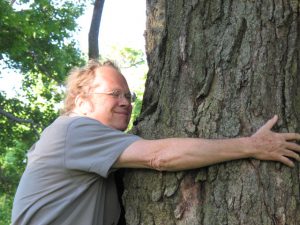 How seldom do we pause to get inside the skin of our natural surroundings, and let nature into our hearts! Oh, the power of a tree to still the mind. And the power of a poem to awaken it in a new realm.
How seldom do we pause to get inside the skin of our natural surroundings, and let nature into our hearts! Oh, the power of a tree to still the mind. And the power of a poem to awaken it in a new realm.


